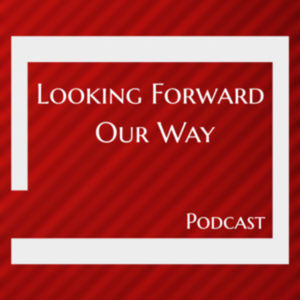
Looking Forward Our Way
Carol Ventresca and Brett Johnson
The Ohio State University's Gerontology and Geriatrics Initiatives

The Ohio State University's Gerontology and Geriatrics Initiatives
Description
In this episode of "Looking Forward Our Way," hosts Carol Ventresca and Brett Johnson welcome Jennifer Bechtel, the program manager for geriatrics and gerontology at Ohio State University's College of Medicine.
The discussion focuses on the challenges and opportunities in the field of gerontology, navigating healthcare for aging populations, empowering individuals to advocate for their own healthcare needs, and the importance of changing societal perceptions of aging.
They explore various aspects of gerontology, emphasizing the need for empathy-based training for medical professionals and advocating for improved healthcare services for older adults.
The episode begins with Bechtel sharing her connection to gerontology, stemming from her experience with her grandparents and her passion for hospice care. She delves into the need for communication and grief recovery support for older adults, setting the stage for a discussion about the challenges of building awareness and knowledge in geriatrics and gerontology within the medical community.
Throughout the episode, the conversation has valuable insights from Bechtel about the services provided by Ohio State University's College of Medicine office of geriatrics and gerontology. She discusses the university's goal of ensuring that medical professionals are equipped with knowledge and empathy to understand the unique needs of older patients, incorporating aging concepts into the medical school curriculum for a more positive and empathetic perspective.
One of the key focal points of the episode is the importance of recognizing and addressing issues of abuse and neglect in older adult populations. Bechtel sheds light on her work with the Central Ohio Area Agency on Aging to educate case managers and emphasizes the significance of understanding and addressing emotional and financial abuse in addition to physical harm in the context of caregiving for older adults.
A major highlight of the discussion revolves around the program initiatives at Ohio State University, including the Aging Connections hub, which plays a pivotal role in providing information and resources for the university community and the public regarding aging-related topics. Bechtel shares details about the program's goals, such as redesigning the website to be more user-friendly and expanding resources to facilitate easier access to information about aging.
Additionally, Bechtel introduces the SAGE (Series in Applied Gerontology Education) program, which offers certificate courses in gerontology, aiming to equip healthcare workers with knowledge and skills for working with older populations. The conversation also touches upon the Buckeye Buddy program, promoting intergenerational understanding and appreciation by involving middle school students in interviewing older adults in the community.
The conversation highlights the importance of changing the perception of aging and celebrating aging positively. They underline the need for continuous communication, connection with multiple resources for assistance, and advocating for one's own healthcare needs.
The impact of COVID-19 on older adults and the medical community's response is also addressed, along with the looming demographic shift where the aging population is projected to outnumber the younger population in the United States by 2034.
Top 5 Takeaways
1. Advocating for oneself in healthcare settings: Understanding the importance of actively participating in conversations with healthcare providers and advocating for individual healthcare needs.
2. Changing the narrative on aging: Addressing societal perceptions and stigmatization of aging, and promoting a positive and celebratory perspective on the aging process.
3. Innovations in gerontology education: Highlighting educational initiatives such as the Series in Applied Gerontology Education (SAGE) program and the Buckeye Buddy program to foster intergenerational understanding and appreciation.
4. Career opportunities in senior care: Exploring career options related to senior care and considering opportunities beyond traditional career paths in healthcare through programs like "Careers That Love You Back".
5. Importance of early conversations about options in the healthcare field: Encouraging discussions about the healthcare field's concentration on older patients, policy, and reimbursement, and the need to prepare for the demographic shift where the aging population will outnumber the younger population.
Memorable Moments
00:00 Passion for grief recovery and hospice involvement.
06:23 Advocate for understanding, and empathy in medical care.
08:30 Preparing med students for aging population responsibilities.
12:23 Early conversations in healthcare careers are crucial.
13:42 Encouraging awareness of diverse career options.
22:15 A national presenter discussed aging statistics and successes.
23:32 Presentations led to meaningful World Cafe discussion.
28:41 Learning about resources for aging population programs.
33:09 Courses introduce knowledge in gerontology for various students.
34:29 Create elder care certification for health workers.
39:37 Service coordinators connect residents to available resources.
40:56 Designation program opens doors for service coordinators.
45:39 Advocate for your care, and connect to resources.
47:28 Access resources for geriatric assessments without delay.
52:35 Encouraging self-administered cognitive evaluation for older adults.
53:50 Change negative perception of aging, celebrate life.
Jennifer Bechtel is a native of Clintonville, and from a young age, she was greatly influenced by her grandparents, who served as her mentors. After attending Xavier University in Cincinnati and earning a degree in communications, Jennifer realized that she wanted to make a difference in the world. She discovered that it was possible to align her professional career with her passion for helping others. This realization has driven Jennifer to pursue opportunities where she can use her skills and talents to positively impact the lives of those around her.
We would love to hear from you.
Give us your feedback, or suggest a topic, by leaving us a voice message.
Email us at [email protected].
Find us on Facebook.
Please review our podcast on Google!
And of course, everything can be found on our website, Looking Forward Our Way.
Recorded in Studio C at 511 Studios. A production of Circle270Media Podcast Consultants.
Copyright 2024 Carol Ventresca and Brett Johnson